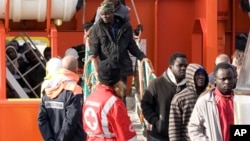The beheadings of 21 Coptic Christians by Islamic militants on the Libyan shore of the Mediterranean Sea, a short boat ride from Italy, has shaken Italians and is prompting a fierce debate here in Rome about what Italy can do to quell the anarchy engulfing its former colony.
Italians have watched with growing alarm for months the raging conflict in Libya between competing militias backing rival governments in Tripoli and Tobruk. The main consequence for Italy has been a rising flow of illegal immigrants, mainly from sub-Saharan Africa, attempting to cross the Mediterranean from the coast of Libya in rickety boats.
Last week, more than 330 people are believed to have drowned making the crossing, and during the weekend, off Sicily, the Italian coast guard rescued 2,000 immigrants traveling in 15 different boats.
But now Italy worries that the rapid emergence of a jihadist group loyal to the so-called Islamic State spells new dangers - specifically, that jihadists might gain access to Italy by posing as illegal immigrants. The black-clad, masked executioners in the video posted Sunday on the Internet, which authorities here say is authentic, appeared to take pains to emphasize that Rome is indeed a target.
On Twitter, accounts associated with the Islamic State posted links to the video carrying the title, "A Message Signed With Blood to the Nation of the Cross." All but one of the Coptic Christians slaughtered near the coastal town of Sirte were Egyptian migrant workers.
In the video, the executioner-in-chief, speaking in accented English, points northward and says: “We will conquer Rome, by Allah’s permission.”
Shortly before the beheadings, Italy’s defense minister, Roberta Pinotti, told Il Messaggero newspaper: ”The risk is imminent. We cannot wait any longer. Italy has national-defense needs and cannot have a caliphate ruling across the shores from us.”
On Thursday, Italy's Prime Minister Matteo Renzi will present to parliament a plan of action, but what he will propose remains unclear.
Along with French leaders, he has for months warned of the dangers for Europe from Libya’s descent into chaos, but he has toned down his defense minister’s more bellicose weekend comments, after Italian media interpreted the remarks as meaning Italy is on the brink of intervening in Libya.
Speaking on Italian television Monday night, Renzi emphasized that Italy can only intervene if part of a U.N.-mandated coalition of Western forces. “We’ve already said to the EU and to the international community that it is time to stop sleeping, that something very serious is happening in Libya," he said, "and that just because we are the closest ones - the guys who pick up the boat people - don’t think you can leave all the problems to us."
The pulling back on talk of any immediate Italian action is a reflection of military reality. Italy doesn’t have the war-making capabilities to intervene alone, say Italian politicians and analysts.
On paper, the Italian army has 105,000 soldiers, but with other peace-keeping commitments overseas and home defense to take into account - as well as readiness, leave and fitness considerations - the country could only deploy 5,000 troops in Libya, says the head of the Italian Senate’s defense commission, Nicola Latorre. That's far too few to impose a solution on the warring factions, let alone contain jihadists; 800 Islamic State-affiliated fighters are estimated to be in the eastern Libyan town of Derna alone.
Latorre says the Italian government should only consider being involved in an international coalition aimed at imposing “measures of containment” rather than conducting war.
A strategy of containment is unlikely to satisfy the French military, whose recent overseas interventions to combat jihadists in Africa, notably in Mali, have been more forward-leaning and aggressive and focused on peace imposition rather than peacekeeping, say analysts.
The idea that only peacekeeping is what will be needed has also provoked the scorn of the editor of La Stampa newspaper, Mario Calabrese, an influential commentator in Italy. “Talk about a peace mission is an obvious fiction, as in the past, because no one will welcome foreign troops with open arms, certainly not the jihadists.”
Italy’s past imperial role in Libya has to be borne in mind, Calabrese says. “Our colonial adventure was made up of massacres and torture, and we have to move very cautiously. The memory [of the past] is alive in Libya and it would be easy to denounce intervention as colonialism and call for a war against the new crusaders.”
Within hours of the gory mass execution, and as Egyptian warplanes retaliated with airstrikes on jihadist training camps and ammunition stores in eastern Libya, Renzi held telephone talks with Egypt’s President Abdel Fattah al-Sissi and French leader Francois Hollande. Italian officials say the talks focused on diplomatic tactics to persuade the U.N. Security Council to mandate an intervention, and did not involve any planning for the three countries to form a military coalition of their own.
The three leaders also discussed the chances of securing an agreement between Libya’s warring militias and competing governments, Italian officials told VOA. But a series of U.N. efforts in recent weeks to broker a deal have proved fruitless so far. The Libya Dawn alliance of predominantly Islamist militias, which controls Tripoli, has denounced Egypt’s retaliation and ordered all Egyptian immigrants to leave Libya immediately.





